Whoa!? Say what!? A low oxalate diet could make kidney stones worse? Perhaps.
Before you panic, make sure to read this entire article. I am NOT saying there is no place for limiting some high oxalate foods for some people. However, I do think that a low oxalate diet is massively over emphasized and prescribed for kidney stone prevention. Most importantly, low oxalate diets are often recommended without proper investigation into the cause of kidney stones.
Let’s dive in.
Table of Contents
Importance of a 24-Hour Urine Test
If you’ve been with me for awhile, you know I am a huge advocate for personalized nutrition for kidney stone prevention. For kidney stone nutrition to work, we must have a 24-hour urine test to know what caused your kidney stones in the first place.
With that information, we can make adjustments to the foods you eat for effective kidney stone prevention! Without that test, we can only take a guess as to what caused your kidney stones and hope that whatever changes you make will prevent stones.
So often, we assume high oxalate is the cause of calcium oxalate stones. But, urine oxalate is often completely normal for people with calcium oxalate stones. If oxalate is normal, a low oxalate diet will not prevent kidney stones.
High urine calcium is the most common cause of calcium oxalate kidney stones. There are many things we can do to lower urine calcium that is completely different than treatment for high urine oxalate.
If you haven’t had a 24-hour urine test, ask your urologist for one TODAY! Get to the bottom of why you are making kidney stones. Grab my tips to ask your doctor for this test.
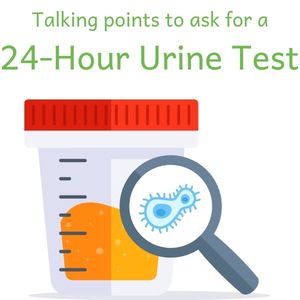
A Low Oxalate Diet is Not For Everyone
A low oxalate diet is not appropriate for everyone with kidney stones. Not even everyone with calcium oxalate kidney stones.
The American Urological Association recommends limiting dietary oxalate only for people who have high urine oxalate on a 24-hour urine test and who have calcium oxalate diet stones. They also recommend making sure people are eating enough calcium to inhibit oxalate absorption. (1)
People often ask: “Shouldn’t everyone follow a low oxalate diet just to be safe?” Absolutely not. A low oxalate diet limits many things we know to be GOOD for kidney stones. If you do not have high urine oxalate, a low oxalate diet will not do much to prevent kidney stones. Why make this more complicated than it needs to be?
Oxalate should be limited only when absolutely necessary. In most cases, simply cutting back on only the very high oxalate foods and eating enough calcium is enough to bring urine oxalate down to the normal range.
How a Low Oxalate Diet Can Make Kidney Stones Worse
Ironically, a low oxalate diet will inevitably limit many things we know are GOOD for kidney stones. This is why I only recommend limiting oxalate when absolutely necessary.
Here is a breakdown of how a low oxalate diet could make kidney stones worse.
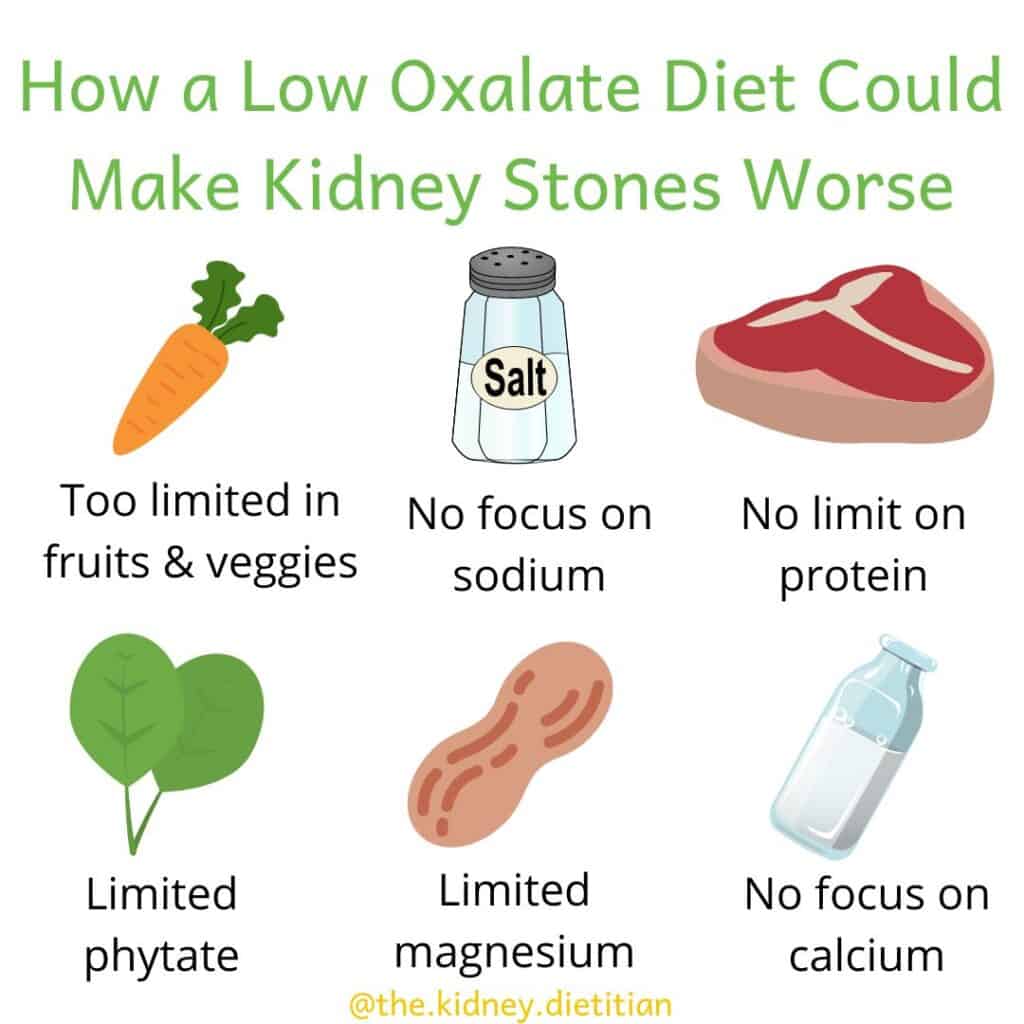
Not Enough Alkali
Bear with me on this one. We have to dive into some nerdy science to understand this one!
Dietary patterns produce either acid or base (aka alkali) during metabolism. In a nutshell, all fruits and vegetables make alkali after we eat them. All animal proteins (except dairy) make acid. Think of the acid load of your diet as a balance between the animal protein you eat vs. the fruits and vegetables. Learn more about dietary acid load.
Most of us eat much more animal protein compared to fruits and vegetables. So, our diets end up making acid. This acid ends up in our urine. Too much acid in your urine makes most types of kidney stones more likely. (2)
Dietary patterns with a higher dietary acid load have been linked to kidney stones. (3) (4)
A strict low oxalate diet limits many fruits and vegetables. Since most of us are eating nowhere near the amount of fruits and vegetables we should be, a low oxalate diet is likely to lower our intake even more. (5)
Lower Urine Citrate
Citrate is a GOOD thing for kidney stone prevention. Citrate makes it harder for calcium-based kidney stones to form. (6)
The best way to get more citrate in your urine? Eat more fruits and vegetables! All kinds of fruits and vegetables can increase urine citrate levels. All fruits and vegetables produce alkali, which makes your body more likely to excrete citrate in your urine.
It is not as important to focus on foods that are higher in citrate. Instead, it is much more important to focus on eating more fruits and vegetables of all types. (3) (7) Eating the right amount of protein is also important to raise urine citrate levels. (3) (7)
Again, because a low oxalate diet limits so many fruits and vegetables, it makes it harder to eat more of these foods. In fact, a low oxalate diet has been associated with lower urine citrate. (8)
Limited in Magnesium
Magnesium plays a role in kidney stone prevention. People with lower blood and urine magnesium levels tend to have more kidney stones. (9) (10) This makes sense, because magnesium can bind to oxalate, so that oxalate cannot bind to calcium to make a kidney stone.
Foods high in magnesium are nearly identical to foods high in oxalate. Foods highest in magnesium are:
- Green leafy vegetables
- Nuts
- Seeds
- Whole grains
- Beans, lentils & peas
- Fortified cereals
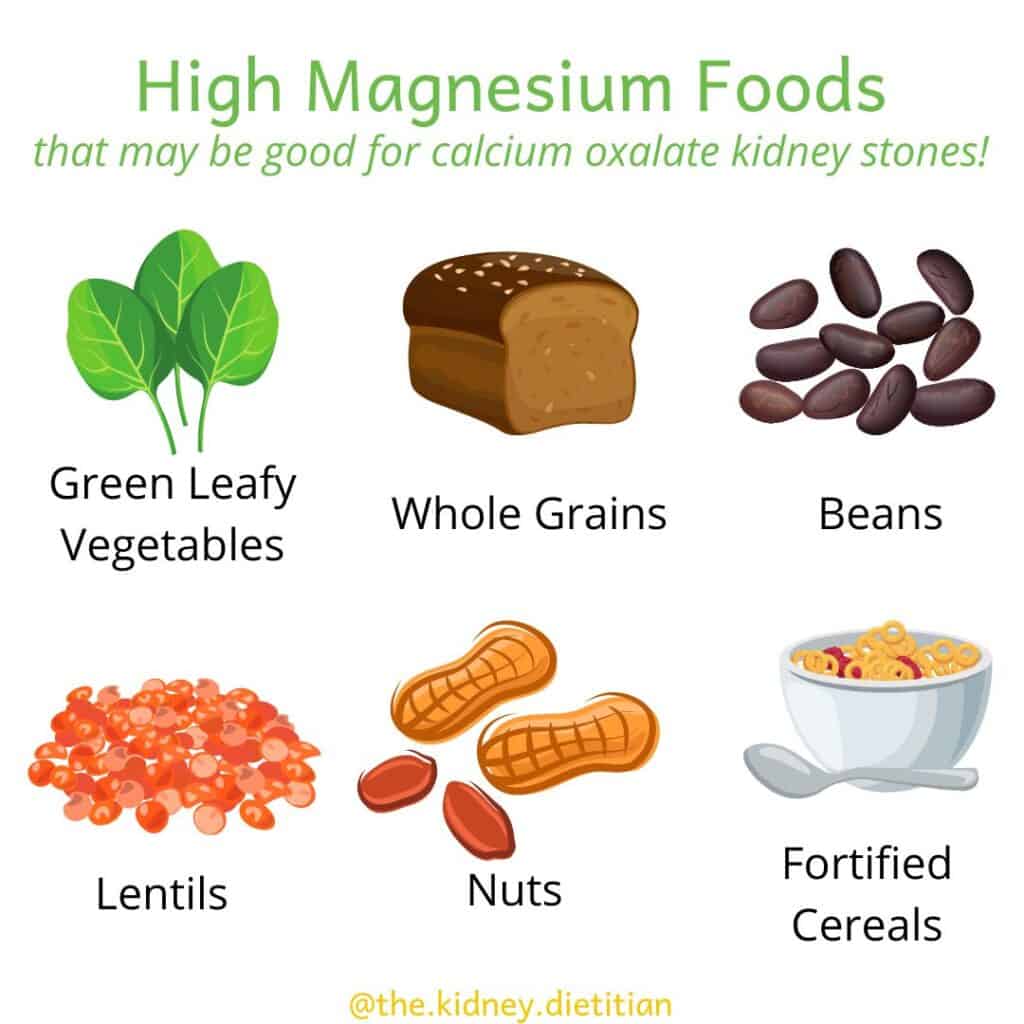
If you are familiar with a low oxalate diet, you know that most of these high magnesium foods are also high in oxalate. When you follow a low oxalate diet, you will inevitably limit how much magnesium you eat too.
Can’t we just take a magnesium supplement? Not so fast. Magnesium supplements have not consistently prevented kidney stones in humans. (11) (12)
There is a low more to know about magnesium and kidney stones. Check out my full article here.
Limited in Phytate
Phytate is a new player in the kidney stone prevention game. Similar to citrate, phytate can bind with calcium and prevent kidney stones. (13)
Phytate is found in whole grains, seeds, legumes and nuts. Exactly the foods that are limited on a low oxalate diet.
We still need to understand more about phytate and kidney stones, but this could be one of the reasons why dietary patterns that include plenty of whole grains, nuts and seeds are associated with fewer kidney stones.
Learn more about phytate and kidney stones.
No Guidance on Sodium, Protein or Calcium
Hopefully, people who have kidney stones are given information on more than oxalate. Unfortunately, this is not always the case. Too often, people are just told to follow a low oxalate diet with little to no information about how to actually do this. They are given an outdated, likely inaccurate list of “high” oxalate foods to complete avoid and sent on their way.
Even worse, they are not given information about things that probably matter much more than oxalate. Depending on 24-hour urine test results, chances are things like fluid, sodium, protein and sugar are much more important than oxalate.
Your Health as a Whole
Of course, we know that fruits and vegetables are good for us. Eating more fruits and vegetables is associated with a lower risk of cancer, cardiovascular disease, diabetes and most chronic health conditions. (14)
A strict low oxalate diet makes it very difficult to eat a balanced diet with plenty of whole grains, fruits and vegetables. Things we know are SO good for us in SO many ways. Obviously preventing kidney stones is important, but we cannot neglect the rest of your body.
What Does Research Say?
No studies have found an association between a low oxalate diet and fewer kidney stones.
We know that a low oxalate diet can reduce urine oxalate. Especially when combined with adequate calcium intake. (15)
However, the amount of oxalate you eat only accounts for about half of the oxalate in your urine. (15) Even if you ate ZERO oxalate (which would be both impossible and a terribly unhealthy diet), we would expect your urine oxalate to go down by a maximum of about 50%.
Despite lower urine oxalate, there has never been a study that found fewer kidney stones when people eat less oxalate. In fact, the only dietary patterns that have been associated with fewer kidney stones are diets likely very high in oxalate. The Dietary Approaches to Stop Hypertension (DASH) and Mediterranean diets are 2 examples. (16) (17) Both of these dietary patterns promote higher oxalate foods like whole grains, vegetables, fruits, nuts and seeds. They have consistently been associated with fewer kidney stones and improvements in urine chemistries. (16) (17)
What!? How can this be? Likely because of all of the reasons outlined in this article. Even though a low oxalate diet lowers urine oxalate, it likely limits all of these other GOOD things like alkali, magnesium and phytate. Perhaps the harm of taking away these beneficial things outweighs the benefit of lower urine oxalate.
Don’t Panic!! Stay Calm and See a Registered Dietitian
I really do not want you to leave this post feeling discouraged. I hope you actually feel more hopeful about kidney stone prevention. Keep these points in mind:
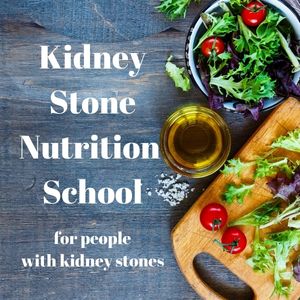
- Nutrition for kidney stone prevention is probably much less restrictive than you think.
- You can enjoy a lot of those healthy fruits and vegetables you love!
- There is a way to understand what is going on in YOUR body and targeting what is off with a personalized kidney stone plan.
How cool is that!? I hope these messages give you hope.
A Registered Dietitian like me can help you put together a personalized kidney stone plan that is effective, healthy, delicious and realistic for YOU!
What If I Really DO Need a Low Oxalate Diet?
Never fear. Even if you need a low oxalate diet, this does not mean things like alkali, citrate, magnesium and phytate are thrown out the window. Chances are, you do not need to limit oxalate as much as you think. Avoiding over-restricting oxalate allows you to eat plenty of these GOOD things.
Most importantly, you need to understand how to balance a lower oxalate diet and still eat plenty of fruits, vegetables and other plant foods. I know this can feel impossible when you are faced with those terrible lists of high oxalate foods. But, I promise, it really is much easier than it seems.
A Registered Dietitian Nutritionist is the best person to help you sort all of this out. Ideally, one that is trained in kidney stone nutrition. I help people prevent kidney stones with personalized goals in Kidney Stone Nutrition School!
Happy Eating!
Melanie

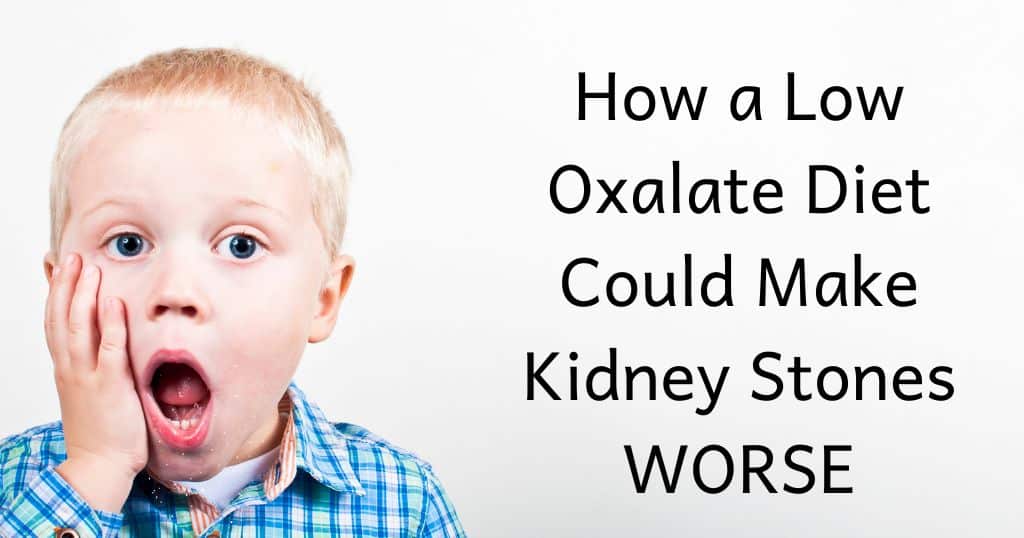
Thanks for a great balanced overview of the oxalate issue, with things to consider other than just diet restriction. Reading your article has spared me from going down that rabbit hole and given the rationale for a holistic, balanced approach. I’m new to the topic, trying to address a few early warning signs (and a strong genetic link to kidney stones) before they develop. Great reminder that whole foods win, along with an informed (not obsessive) awareness of oxalate levels in what’s being eaten. Without knowing it I’d often been eating only high oxalate foods for days in a row (fav. greens, nuts, avocados, fruits etc), oblivious of the link with various symptoms showing up. Since learning about oxalates and giving attention to balancing the variety, range and combinations of foods I eat, symptoms are definitely improving. Thanks again for the inspiration!
So glad I could help and SO wonderful to hear I stopped you from going down the rabbit hole. It is easy to do!
Hello, my son has higher magnesium, potassium and calcium urine excretion and calcium oxalates were found in the urine (doctor did a 24-hour test). Doctors also say they do not know the reason of it, however, they presume it is probably due to “immature” urinary system and will probably be ok in a few years. He does not have kidney stones, but should I change something in his diet to avoid health problems? Thank you
Hi Eva! There might be things to look out for – but stones in kids are usually completely different than adults. We certainly wouldn’t recommend a ton of limitations for him since growing is always the #1 priority! I truly cannot say what is best for your son without working more with you, him and understanding more about his medical situation and current eating habits.
Hi! This was an interesting read! Scary too. A few quick questions that have been bothering me:
1- Is the problem with CALcium supplication that you usually take that NOT with food? If supplemented, say Oat milk or something similar, is taken WITH FOOD, would that make it ok? And of course no overdoing mgs..
2- If Citrate is normal in 24 hour test@385 (oxalate normal 17, Mag 94, uric 428) and the only highs are pH8, Calcium 350 and sodium 144, is taking citrates/lemon juice bad?
Thank you
Hi Bea! I really don’t mean for this to be scary! But, I do want to stress how silly it is to avoid oxalate unnecessarily – as SO many people are. This article about calcium will help you on the calcium question. With high urine calcium, calcium PILL supplements should be avoided at all cost. For your citrate question, taking a large dose of citrate in the form of potassium citrate or a supplement COULD be harmful with those results.
I have a couple resources to really help you dive into those urine test results. My Kidney Stone Guide is a great starter resource – all the way up to VIP enrollment in Kidney Stone Nutrition School which includes direct help from me. You can learn about all of them here!
Thank you! I did read your Calcium article and it was helpful! Im still not sure about the supplemental calcium found in different milks, and Oj and things like that. Is that the same as pills or no? Is it ok to use that (vs consuming dairy calcium) if you just cannot do dairy? (Without going over 1200mg)?
And is lemon juice citrate? That would be bad with my high pH and high urine calcium? (Or pH doesn’t matter here)
There honestly isn’t research comparing calcium supplemented products vs. calcium pills. My answer would truly come down to your 24-hour urine test results! I’d love to help you figure all of this out!
What really bothers me here for example at the magnesium section, you say we almost cant go around certain high oxalate foods because we need certain minerals (like magnesium) when you can just take a magnesium supplement. Sure a varied is diet is important but for near ‘perfect health’ you cant get around taking certain supplements. Some are more univeral, some are more personal.
Trial after trial shows that ALL nutrients from food are better. We just can’t replicate the benefits of real food in a pill. Certainly there are times in special populations where supplements are necessary and helpful. But the vast majority of us DO NOT need to be taking multivitamins of any sort.
Thanks for useful post!
You are so welcome!
How much calcium should I have daily?
You can learn more about calcium and stones here!
Melanie, I do not want to sound like VP Harris but I would like to see a Venn diagram of the intersection of low Na, low oxalate, moderate animal protein and high citrate foods. It would make life easier trying to shop for and cook that diet. Might be good to try to throw in diabetic and low fat., low cholesterol too.
Haha. I completely understand where you are coming from! I think the key is that this whole this is about food PATTERNS. Not individual foods. Truly, ANY food can fit into a kidney stone friendly diet. ANY of them! 🙂 Getting a good understanding of how to build healthy meals is SO much more important than lists of “good” and “bad” foods. These make it overly restrictive!
Sometimes, for some people, a system of good vs bad food works. I have worked with people with both medical and mental illnesses especially with very concrete thinking. I initially did not agree with the strict advice of one MD to all the people with schizophrenia who developed type II DM. He would tell them that they cannot have Chinese food or juice but it did work for people who could not grasp concepts like Na content or carb counts.
Certainly all people are different! The issue with an “all or nothing” on the oxalate front is that a strictly NO oxalate diet would be terribly unhealthy. As you point out, it is just so important to work with people to see what is best for them!
Seems to me that there are many contradictions or the like in the varied posts that I have read here. Seems overly complicated to me and I assume many others. Just my honest opinion.
That is fair! Nutrition for stones is anything but straightforward and is NOT the same for everyone. I think those things tend to account for a lot og the confusion for most people! It is so important to work with a professional to know what is best for YOU.
Hi! Thank you for the post. What causes the other 50 percent of the oxalate in the urine and how can that be reduced?
There is a LOT we don’t understand about oxalate metabolism and balance. Some of it is liver production of oxalate, some of it is likely differences in microbiome. Some of it we truly don’t understand!
This one just turns everything upside down for me.
I always like to challenge people!
I AM leaving this post feeling discouraged. Very.
I’m so sorry to hear that! That is definitely not my intention, but rather to help people understand how important it is to make sure your diet is well balanced and personalized to YOUR stone risk factors. It really is SO important to work with a dietitian to help you know exactly what YOU should eat.
Me too, lucky I have not had one since July last year Burt I been following dietician recommendations. After reading this and talking to others that have kidney stones I come to the conclusion it’s like a shot in the dark. The ones I have talked to haven’t changed anything diet or lifestyle never got them again while others who were vigilant get them frequently. Seems genetics play the biggest role so given that I am getting them again sometime in my future can’t fret anymore